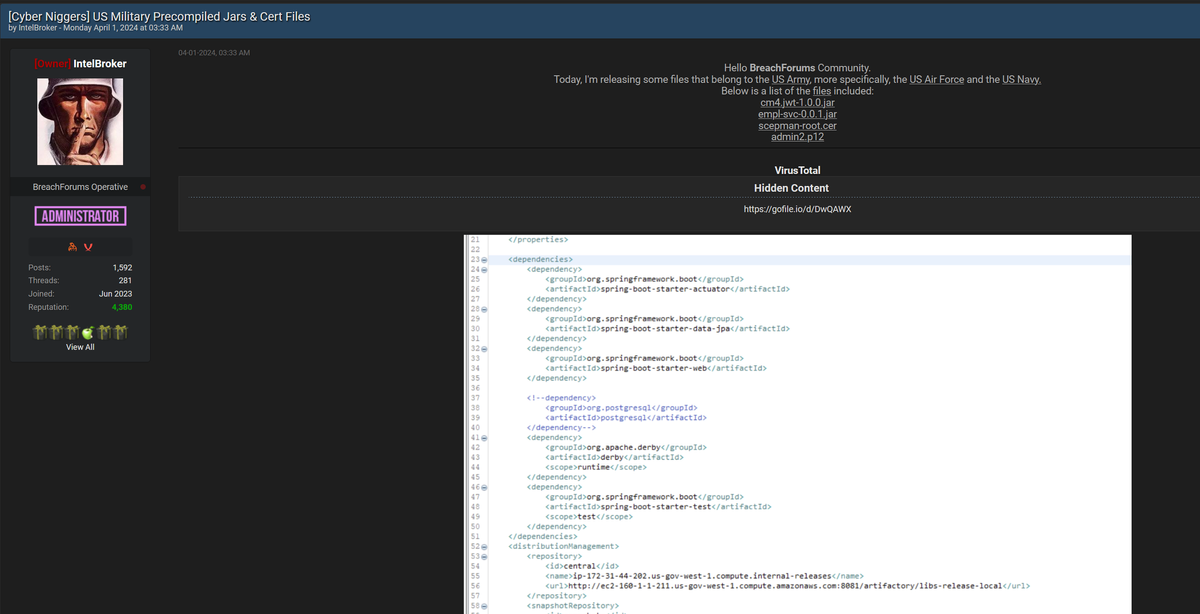Critical US Military Data Compromised
Sensitive US Military files leaked by IntelBroker on BreachForums. This could have serious national security implications. Get the full story now. #CyberSecurity #DataBreach

In the post from April 1, 2024, IntelBroker claims to have released files related to the US Army, US Air Force, and US Navy. The files reportedly include:
- cm4-jwt-1.0.0.jar
- empl-svc-0.0.1.jar
- secpmain-root.cer
- admin2.p12
These files appear to contain precompiled Java Archive (JAR) files and digital certificates, which could potentially be used to authenticate users or systems within military networks. If legitimate, this leak could represent a severe compromise of US military systems, potentially allowing unauthorized access to critical infrastructure.
The file types suggest that the breach may involve software or system components used in secure communications or authentication processes within the military. The .jar files are likely related to Java applications, while the certificate files (.cer and .p12) are typically used for SSL/TLS encryption, identity verification, or code signing.
Threat Actor Profile
IntelBroker is not just a pseudonym but a brand in the dark web ecosystem, associated with various breaches that involve high-profile targets, particularly within the public sector and large corporations. The individual or group behind this alias operates with significant technical knowledge and access to exclusive or well-guarded information.
IntelBroker's activities typically focus on exposing vulnerabilities in governmental and corporate systems, often aiming to embarrass or destabilize the target organizations. The posts made by IntelBroker are meticulously detailed, demonstrating a deep understanding of the compromised systems, which suggests the involvement of experienced cybercriminals or insider threats.
Impact Analysis
The release of these files could have several implications:
- National Security Risk: If these files are authentic and contain valid credentials or system components, they could allow unauthorized access to sensitive military networks. This breach could expose classified information or disrupt military operations.
- Cyber Espionage: The files might be used by foreign adversaries to infiltrate US military systems, leading to espionage or sabotage.
- Public Trust: Such a breach undermines public confidence in the security of governmental systems, especially those related to national defense.
- Technical Exploitation: Cybercriminals and nation-state actors might exploit these files to develop further attacks, either by reverse-engineering the software or by using the certificates to impersonate trusted entities.
Prevention Tips
To mitigate the risks from such breaches, organizations, especially those handling sensitive information, should implement the following measures:
- Regular Audits and Penetration Testing: Conduct frequent security audits and penetration testing to identify and fix vulnerabilities before they can be exploited.
- Advanced Monitoring and Threat Detection: Employ advanced monitoring tools to detect unusual activities, such as unauthorized access attempts, in real-time.
- Zero Trust Architecture: Implement a zero-trust security model that requires continuous verification of identities and access levels, regardless of the user’s location within the network.
- Immediate Revocation of Compromised Certificates: As soon as a certificate is known to be compromised, it should be revoked and replaced with a new one.
- Enhanced Access Controls: Restrict access to sensitive files and systems based on the principle of least privilege, ensuring that users only have the minimum access necessary to perform their duties.




